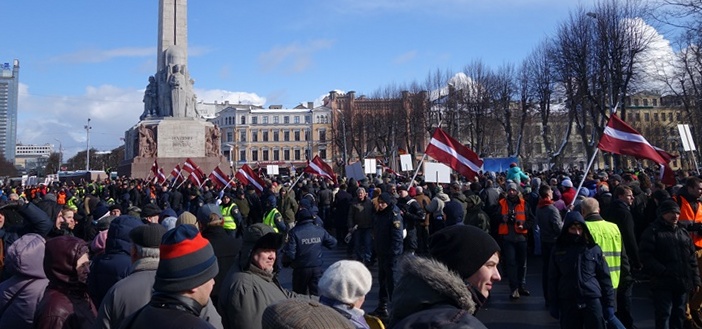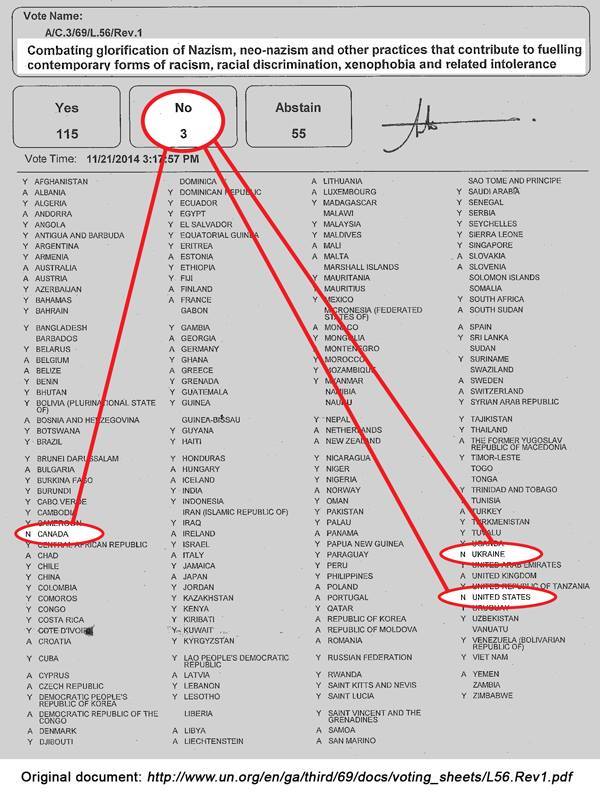Canada Joins U.S. and Ukraine in Voting Against Anti-Nazi Resolution
The Third Committee of the UN General Assembly is tasked with tackling social,humanitarian and human rights issues.
The Resolution passed on November 21 voices concern over the rise of racism-driven crimes around the world and the influence that parties with extremist agendas are gaining.
It calls for the universal adoption of the International Convention on the Elimination of All Forms of Racial Discrimination. Many nations including the U.S., the UK, China and India, signed the Convention but did not recognize a mechanism to resolve individual complaints it establishes, which makes the Convention unenforceable in their jurisdictions.
The Resolution also decries attempts to whitewash Nazi collaborators by depicting them as freedom fighters. It condemns any form of denial of Nazi war crimes, including the Jewish Holocaust.In what has become an annual event in Vilnius, Latvia in recent years, supporters of Latvian Waffen SS troops hold a commemorative march on March 16, 2014. The support for Nazism and the rehabilitation of war Nazi criminals throughout Europe in the context of the U.S. imperialist aggression, war and attempts to isolate Russia underscores the necessity of the anti-Nazi resolution at the UN.

In what has become an annual event in Riga, Latvia in recent years, supporters of Latvian Waffen SS troops hold a commemorative march on March 16, 2014. The support for Nazism and the rehabilitation of war Nazi criminals throughout Europe in the context of the U.S. imperialist aggression, war and attempts to isolate Russia underscores the necessity of the anti-Nazi resolution at the UN.
The resolution "Expresses deep concern about the glorification, in any form, of the Nazi movement, neo-Nazism and former members of the Waffen SS organization, including by erecting monuments and memorials and holding public demonstrations in the name of the glorification of the Nazi past, the Nazi movement and neo-Nazism, as well as by declaring or attempting to declare such members and those who fought against the anti-Hitler coalition and collaborated with the Nazi movement participants in national liberation movements."
Russia, which submitted the draft resolution, said it regretted that it could not be adopted unanimously.
"The fact that the U.S., Canada and Ukraine voted against, while delegations from EU member states abstained in the vote on this draft resolution, which was supported by an overwhelming majority of the UN member states, is extremely regrettable," the Russian Foreign Ministry said in a statement.
"Ukraine's position is particularly dispiriting and alarming. One can hardly understand how a country, the people of which suffered their full share of the horrors of Nazism and contributed significantly to our common victory against it, can vote against a resolution condemning its glorification," the ministry said.

Record of the vote on the anti-Nazi resolution at the UN's Third Committee,
November 22, 2014, highlightng the ignominious role of the U.S., Canada and Ukraine --
click to enlarge.
|
"As long as Stalinism and neo-Stalinism are not condemned as strongly as Nazism, neo-Nazism and other forms of hatred, Ukraine would not be able to back this document," Tsymbalyuk said.
The blogger Vladimir Suchan comments on the Ukrainian stand:
"[T]he fact is that Stalin was the leader who led and organized the defeat of Nazism in WWII. The Ukrainian demand to condemn Stalin (or Stalinism), really just a foil for the Soviet Union, in the resolution against Nazism is as good as demanding that the main enemy and victim of Nazism be condemned together with Nazism itself. Further, to assume that Stalin and Nazism represent the same thing is a thought which liberalism propagated and behind which new Nazis try to shield themselves and advance their own interests. Moreover, the demand to condemn Nazism today has a direct bearing on today's politics, while Stalin does not present any obvious direct threat to anyone. And it was Nazism that started World War II. Not Stalin. Nazis carried out the Odessa massacre, and among the victims were also Odessa communists. At the earthly plane, no one is without[...]sins, as Christianity says. However, this does not mean that there is moral/immoral equivalence or that complete relativism or pretentious neutrality is the way to go. A cut and determination has to be made, and a stance (and side) has to be taken."
Suchan continues: 'It is also not that hard to see that Ukraine's Nazi regime is trying to use 'Stalinism' as a code-word for anyone who fights today's Nazism -- for the opponents of Nazism. They thus tried to destroy the resolution by insisting on including in it their own opponents -- enemies of Nazism. A cynical and sophistic move. It would be similar to insisting that a resolution against communism should also include a condemnation of U.S. genocide against the Native people and slavery in the U.S., the latest to be officially abolished in the 'democratic' and 'developed' world. Or if, in a resolution praising the Allied victory in World War II, someone would insist on condemning the nuclear holocaust of Hiroshima.
"So who is fighting Nazism today? Certainly not the U.S. or Ukraine."
(Photos: Defending History, I Don't Like What Stephen Harer Is Doing to Canada)
(TML Daily No. 98, November 24, 2014)